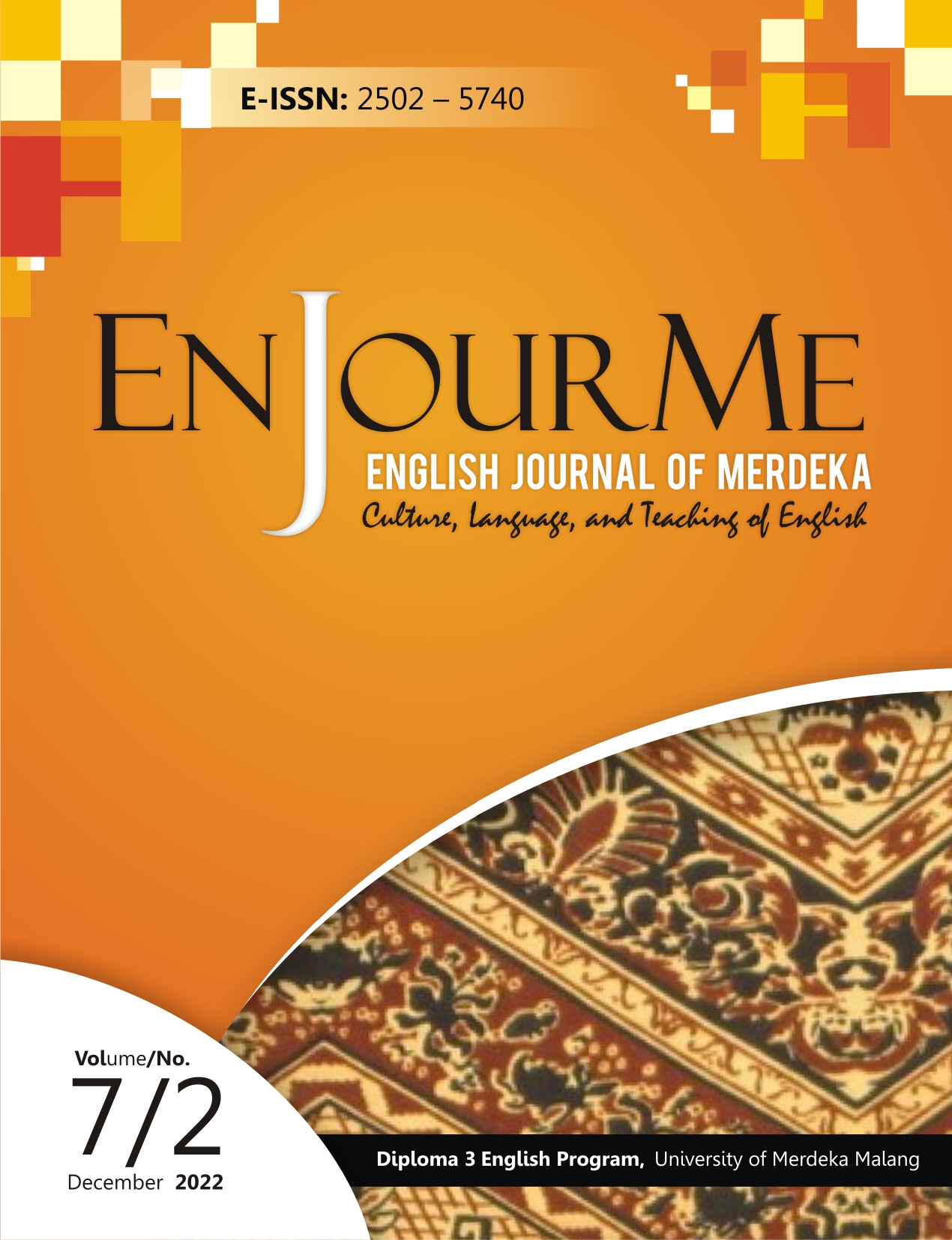Indonesian undergraduate students' perceptions of problem-based learning implementation in an ELT class: A small-scale survey
DOI:
https://doi.org/10.26905/enjourme.v7i2.9032Keywords:
English Language Teaching, Perception, Problem-Based LearningAbstract
This study aimed at identifying Indonesian undergraduate students’ perceptions of Problem-Based Learning (PBL) implementation in an English language education department at a private university in Indonesia. Using total population sampling, 74 students who were taking a language classroom management course in which PBL was implemented through collaborative work were involved in this survey study.  The data were collected using a 21-item questionnaire from Jaeger and Adair (2014) that was based on Senocak (2009). The data were then analyzed statistically to identify the participating students’ perceptions of PBL implementation by interpreting the patterns of the data. Based on the results of this study, the participants tended to perceive that PBL helped them become more self-directed. However, many of them felt that the collaborative work implemented in PBL was more a difficulty than an ease. The implication of this study is also discussed.
DOI:Â 10.26905/enjourme.v7i2.9032
Downloads
References
Allen, D. E., Donham, R. S., & Bernhardt, S. A. (2011). Problem-based learning. New Directions for Teaching and Learning, 2011(128), 21–29. https://doi.org/10.1002/tl.465
Cheadae, A., & Khongput. S. (2019). Thai EFL students’ perceptions toward learning English descriptive paragraph Writing through Problem-Based Learning. Veridian E-Journal, Silpakorn University (Humanities, Social Sciences and Arts), 12(6), 1688–1704. https://he02.tcithaijo.org/index.php/Veridian-E-Journal/article/view/160112
Cahyani, H., & Setyawati, R. W. (2017). Pentingnya peningkatan kemampuan pemecahan masalah melalui PBL untuk mempersiapkan generasi unggul menghadapi MEA. PRISMA, Prosiding Seminar Nasional Matematika, 151–160. https://journal.unnes.ac.id/sju/index.php/prisma/article/view/21635
Gijselaers, W. H. (1996). Connecting problem-based practices with educational theory. New Directions for Teaching and Learning, 1996(68), 13–21. https://doi.org/10.1002/tl.37219966805
Hapsari, A. G. S., & Kuswandono, P. (2020). Designing Problem-based Learning through narrative stories for Microteaching class using ADDIE Model. JEELS (Journal of English Education and Linguistics Studies), 7(2), 187–217. https://doi.org/10.30762/jeels.v7i2.2133
Heale, R., & Twycross, A. (2015). Validity and reliability in quantitative studies. Evidence Based Nursing, 18(3), 66–67. https://ebn.bmj.com/content/ebnurs/18/3/66.full.pdf
Hmelo-Silver, C. E. (2004). Problem-Based Learning: What and how do students learn? Educational Psychology Review, 16(3), 235–266. https://doi.org/10.1023/b:edpr.0000034022.16470.f3
Hmelo-Silver, C. E., & Barrows, H. S. (2006). Goals and strategies of a Problem-based Learning Facilitator. Interdisciplinary Journal of Problem-Based Learning, 1(1). https://doi.org/10.7771/1541-5015.1004
Hmelo-Silver, C. E., & Eberbach, C. (2011). Learning theories and Problem-Based Learning. Problem-Based Learning in Clinical Education, 3–17. https://doi.org/10.1007/978-94-007-2515-7_1
Jaeger, M., & Adair, D. (2013). The influence of students’ interest, ability and personal situation on students’ perception of a problem-based learning environment. European Journal of Engineering Education, 39(1), 84–96. https://doi.org/10.1080/03043797.2013.833172
Kumar, M., & Kogut, G. (2006). Students’ perceptions of problemâ€based learning. Teacher Development, 10(1), 105–116. https://doi.org/10.1080/13664530600587295
Linda, L. & Apandi (2019). The analysis of Problem Based Learning (PBL) in Micro Teaching Course to fit the requirement of effective Pre-service teachers. Academic Journal Perspective : Education, Language, and Literature, 7(2), 119. https://doi.org/10.33603/perspective.v7i2.2652
Price, P., Jhangiani, R., & Chiang, I. (2015). Research Methods of Psychology – 2nd Canadian Edition. Victoria, B.C.: BCcampus. Retrieved from https://opentextbc.ca/researchmethods/
Savery, J. R. (2006). Overview of Problem-based Learning: Deï¬nitions and distinctions. Interdisciplinary Journal of Problem-Based Learning, 1(1). https://doi.org/10.7771/1541-5015.1002
Senocak, E. (2009). Development of an instrument for assessing undergraduate science students’ perceptions: The Problem-Based Learning environment inventory. Journal of Science Education and Technology, 18(6), 560–569. https://doi.org/10.1007/s10956-009-9173-3
Additional Files
Published
How to Cite
Issue
Section
License
Authors who publish with this journal agree to the following terms:
(1) Copyright of the published articles will be transferred to the journal as the publisher of the manuscripts. Therefore, the author confirms that the copyright has been managed by the journal.
(2) Publisher of EnJourMe (English Journal of Merdeka) : Culture, Language, and Teaching of English is University of Merdeka Malang.
(3) The copyright follows Creative Commons Attribution–ShareAlike License (CC BY SA): This license allows to Share — copy and redistribute the material in any medium or format, Adapt — remix, transform, and build upon the material, for any purpose, even commercially.




